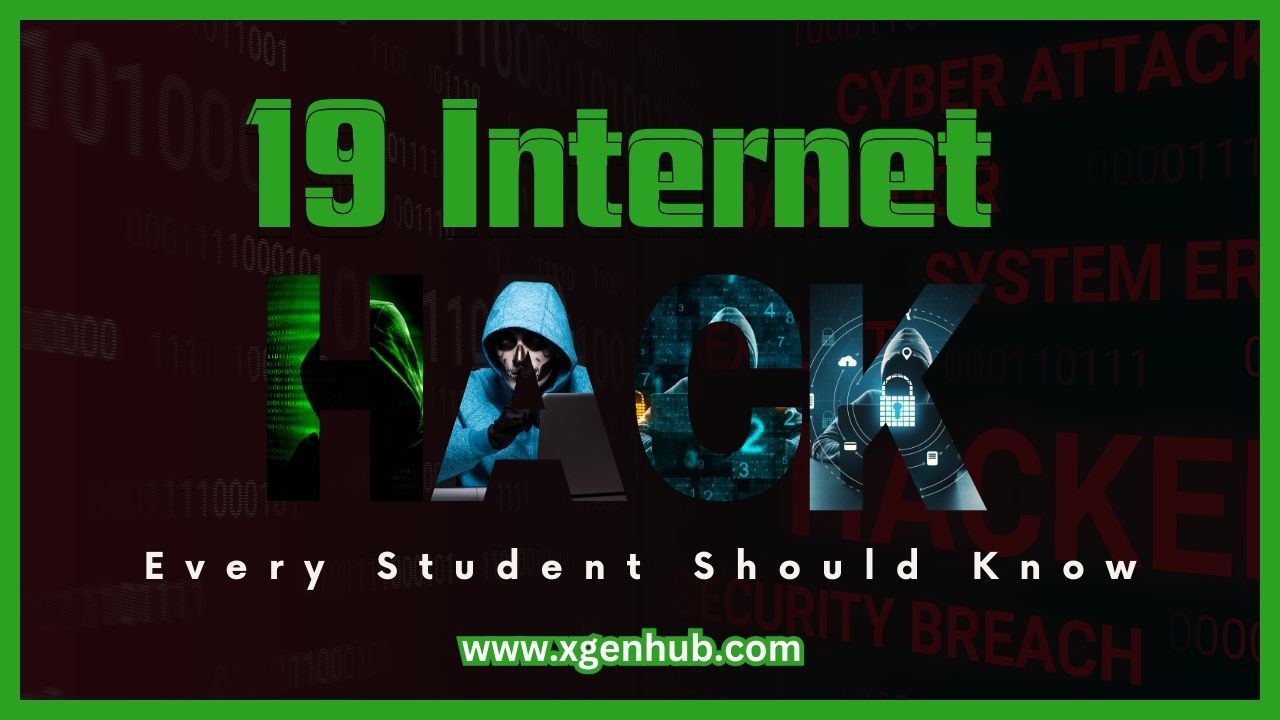As a student, the internet can be your best friend. It’s a gateway to knowledge, resources, and endless possibilities. But navigating the online world efficiently can be tricky. Here are 19 internet hacks every student should know
>> Financial Freedom Awaits! Start Securing Your Future Wealth Today. <<
Internet hacks refer to exploits or techniques that allow someone to gain unauthorized access to computer systems, data, or other Internet-connected devices and services. Hackers use a variety of methods to find and take advantage of vulnerabilities in software, networks, and computers. Some common examples of Internet hacks include phishing attacks, denial-of-service attacks, SQL injection attacks, and cross-site scripting exploits.

While hacking used responsibly can help identify security weaknesses, most hacking has malicious intent. Hackers may steal private data, install malware, deface websites, take control of devices, or even take entire systems offline. Major companies, government agencies, and individuals have fallen victim to hackers looking to make money, cause mayhem, further political agendas, or gain a sense of notoriety. With so much personal and sensitive information now stored online, Internet hacks pose a significant threat to privacy, finances, intellectual property, and even public infrastructure. Ongoing training, vigilance, and updated security protocols are required to try to stay one step ahead of the latest hacking techniques and vulnerabilities.

Research and Learning:
In short, researching and learning life hacks not only makes a student’s college experience easier, but also equips them with broadly applicable skills for adult life. It empowers students to thrive both in and beyond their college years. here are Internet Hacks Every Student Should Know.
>> Financial Freedom Awaits! Start Securing Your Future Wealth Today. <<
- Pro Google Search: Master advanced search operators like “filetype:pdf” to find specific file types, or “site:.edu” to limit results to educational websites.
- Free E-books and Journals: Utilize online libraries like Open Library or Project Gutenberg for free access to millions of books and academic journals.
- Online Courses and Tutorials: Khan Academy, Coursera, and edX offer free and affordable online courses on various subjects, perfect for supplementing your studies or learning new skills.
- Scholarly Search Engines: Use Google Scholar or JSTOR to find credible academic research papers and articles related to your studies.
- Citation Generators: Tools like EasyBib or Zotero automatically generate accurate citations in various styles, saving you time and frustration.
There are a few key reasons why researching and learning life hacks can be useful for students:
- Life hacks help improve productivity. Students have busy schedules and lots going on. Learning tips and tricks for things like time management, organization, study methods, and productivity can help students work smarter, not harder. This leaves more time for socializing, extracurriculars, and pursuing hobbies.
- Life hacks reduce stress. School can be overwhelming with homework, exams, projects, and more. Discovering life hacks that simplify tasks, streamline workflows, or help avoid common stressors can make student life more manageable and enjoyable. Less stress equals better mental health and wellbeing.
- Life hacks build key life skills. Learning how to budget, cook simple nutritious meals, make smart shopping choices, and manage time effectively are all skills that set students up for independence and success after graduation. Getting an early start by learning useful life hacks helps students transition smoothly into adulthood.
- Sharing life hacks can help others. Learning which life hacks work well allows students to pass on that useful knowledge with classmates, roommates, friends, and younger students. Building a repertoire of helpful life hacks enables students to make a positive impact and help others navigate student life more easily.
Productivity and Organization:
Productivity and organization are closely related concepts that play a key role in being able to effectively accomplish goals. Here’s an overview & Internet Hacks Every Student Should Know.:
Productivity refers to how efficiently and successfully an individual is able to complete tasks, projects, and goals. It is measured by assessing outputs or results against the time, resources, and effort invested. High levels of productivity means achieving greater outputs with fewer or the same inputs. Some key enablers of productivity include:

- Time management: Setting priorities, schedules, deadlines, and minimizing distractions.
- Energy management: Getting proper rest, taking breaks, and maintaining motivation and focus.
- Resource optimization: Using tools and technology effectively and delegating where possible.
- Progress tracking: Setting measurable targets, benchmarking, and analyzing performance metrics.
Organization supports productivity by enabling discipline, structure, order and efficiency when managing tasks, information, and resources needed to accomplish goals. Some key elements of organization are:
- Planning and scheduling
- CLEAR goals and outcome setting
- To-do list maintenance
- Managing information and paperwork through filing systems and knowledge management strategies
- Effective resource coordination and allocation
- Tidiness and space optimization
>> Financial Freedom Awaits! Start Securing Your Future Wealth Today. <<
- To-Do List Apps and Calendars: Stay organized with tools like Trello, Todoist, or Google Calendar. Create tasks, set deadlines, and manage your schedule effectively.
- Cloud Storage: Save your work and access it from anywhere with platforms like Google Drive, Dropbox, or OneDrive. No more lost files or USB drives!
- Password Managers: Use a secure password manager like LastPass or 1Password to manage all your online accounts and create strong, unique passwords.
- Focus and Time Management Tools: Tools like Forest or Freedom block distracting websites and apps, helping you stay focused on your studies.
- Text-to-Speech and Note-Taking Apps: Evernote, OneNote, or Otter.ai let you capture notes, record lectures, and convert text to speech for easier review.
Saving Money and Resources:
College students have restricted budgets, so saving money allows them to cover basic needs and avoid debt during their studies. Being frugal also develops crucial life skills that benefit students long after graduation. Learning to budget, bargain hunt, minimize expenses, and save for goals establishes strong financial management abilities. With prudent saving and spending habits, students can enjoy occasional entertainment or hobbies, handle emergencies when they arise, and successfully transition into independent living after university. Basically, cultivating wise resource optimization makes college more fulfilling and paves the way for real-world success.

- Student Discounts: Many websites and services offer student discounts. Always ask if one is available before paying!
- Free Office Software: Utilize free alternatives like LibreOffice or Google Docs instead of expensive proprietary software for document creation and editing.
- Open Educational Resources (OERs): Find free textbooks, course materials, and educational resources on OpenStax or MERLOT to reduce textbook costs.
- Second-Hand Platforms: Buy affordable textbooks and used items on platforms like Amazon Marketplace or Facebook Marketplace.
- Budgeting Apps and Tools: Track your spending and manage your finances with apps like Mint or YNAB, helping you avoid unnecessary expenses.
Communication and Collaboration:
Listen actively. Make eye contact, focus completely, nod and useEncouraging verbal cues. Avoid interrupting and be open to different viewpoints. This builds rapport and trust, encouraging others to communicate openly with you.
>> Financial Freedom Awaits! Start Securing Your Future Wealth Today. <<
Ask purposeful questions. Asking thoughtful questions shows you are interested in understanding another’s perspective. It also helps uncover shared goals around which you can collaborate.

Be clear and succinct. Convey your ideas, concerns and questions clearly and precisely without rambling. It makes you easier to understand and more approachable.
Be timely in responding. Reply to messages, emails and meeting invites promptly. Delayed responses frustrate collaborators and hinder productivity.
Stay positive even in disagreement. Frame critiques and constructive criticism positively by focusing on resolving issues, not assigning blame. It facilitates cooperation.
Offer appreciation and credit. Recognize efforts and contributions of your professors, classmates and group members. People are motivated when their work is valued.
Following these basic principles of attentive, respectful and responsive communication fosters relationships that form the foundation for meaningful collaboration. By consciously applying these tips, students can greatly enhance their ability to cooperate effectively with classmates on projects, assignments and in study groups. The ability to work productively with others is invaluable beyond graduation as well, making these important skills to develop early on.
- Video Conferencing and Online Learning Platforms: Zoom, Google Meet, and Microsoft Teams make online collaboration, group projects, and virtual meetings a breeze.
- Mind Mapping and Collaboration Tools: Tools like Miro or Coggle let you brainstorm ideas, create mind maps, and collaborate with classmates in real-time.
- Language Learning Apps and Websites: Duolingo, Memrise, or Babbel make learning new languages fun and accessible, while online dictionaries and translators are your multilingual friends.
- Stay Connected with Friends and Family: Social media platforms like Facebook, Instagram, and WhatsApp help you stay in touch with loved ones and build online communities.
>> Financial Freedom Awaits! Start Securing Your Future Wealth Today. <<
Remember, the internet is a powerful tool, but use it wisely. Explore its possibilities, embrace these hacks, and make the most of your online student experience!
These are just a few suggestions, and the internet is constantly evolving. Always be curious, keep exploring, and discover the hacks that work best for you!
9 Ingenious Money-Making Ideas to Fast-Track Your Wealth
Thank you for taking the time to read my rest of the article, 19 Internet Hacks Every Student Should Know

Wow, awesome blog layout! How lengthy have you been blogging
for? you make blogging glance easy. The total look of your site
is great, let alone the content material! You can see
similar: najlepszy sklep
and here dobry sklep
synthroid brand coupon
australia online pharmacy free shipping
canada drugstore pharmacy rx
generic tadalafil canada
legitimate canadian mail order pharmacy
buy synthroid medication online
american pharmacy
happy family rx
cipla cialis
canadian pharmacy 365
synthroid order
dexamethasone price in usa
acyclovir 5 cream over the counter
dark web access https://mydarkmarket.com/ – darknet market lists dark website
how to get strattera
drugs from canada without prescription
online pharmacy without precriptions
retin a cream price in india
buy cialis in canada
order diflucan online
vermox 500mg uk
dexamethasone 8 mg
geinoutime.com
Hongzhi 황제, Ma Wensheng 등도 제방에 서서 멀리서 지켜 보았습니다. ,
geinoutime.com
Xiao Jing은 매우 의아해하며 입으로 말했습니다. “이 … 이 … 노예도 모릅니다.”
ciprofloxacin 500mg online
retin a 0.025 canada
doxycycline for sale usa
geinoutime.com
마침내 정신이 나간 관리들은 환호했습니다.
bactrim 400 80 mg
baclofen where to buy
top rated canadian pharmacies online
tadacip 20 mg online
lyrica generic medication
best tadalafil tablets
cost baclofen
마종 웨이즈
Hongzhi 황제는 미소를 지었고 갑자기 그의 눈은 구석에있는 황제의 손자 Zhu Zaimo에게 떨어졌습니다.
augmentin cream
canadian generic pharmacy
cheap valtrex for sale
average price of doxycycline
canadian drug store online
buy tadacip online in india
dexamethasone tablet 1mg
canadian pharmacies online
dexamethasone 2 mg price
buy clomid online prescription
acyclovir online india
valtrex online
cheap prescription drugs
furosemide discount
advair 100mcg 50mcg
dexamethasone 0 75 mg
acyclovir 100 mg
metformin canada over the counter
flomax brand name
doxycycline capsules india
advair diskus 250 mcg
tamoxifen 10 mg online
buy cheap flomax
토토 사이트 검증
“폐하와 Fang Jifan… 그들은 돼지를 보러갔습니다.”
sildenafil rx coupon
dexamethasone uk
buy cheap propecia uk
에그벳슬롯
능력과 도덕성 모두 고대인에게는 미덕이 항상 재능보다 우선합니다.
purchase advair from canada
ciprofloxacin order online
augmentin over the counter uk
cost doxycycline tablets
zovirax pharmacy
where to get retin a gel
doxycycline cheap uk
prednisone 2.5 mg cost
where to buy clomid uk
doxycycline price singapore
vibramycin 100mg
tamoxifen 40 mg price uk
where can you buy zithromax
vermox india
propecia compare prices
how can i get propecia
buy albuterol
buy dexamethasone without prescription
azithromycin no rx
generic lyrica from canada
vermox united states
can you buy clomid over the counter in australia
where can i buy vermox online
lasix 60 mg
bactrim online
cost doxycycline
dexamethasone brand name
where to buy nolvadex usa
vermox purchase
advair buy online
buy lyrica online australia
[url=https://sildalis.store/]buy sildalis online[/url]
how can i get diflucan over the counter
diflucan canada
accutane 120 mg
dexamethasone 8 mg tablet
tadalafil 22 mg
flomax online order
Очистка воды имеет важное значение в обеспечении оптимальной работы производственного оборудования – https://machinetechsolutions.ru/jeffektivnaja-ochistka-vody-s-filtrom-gejzer-3-vk-2/. Процедура предполагает фильтрацию и подготовку воды для исключения нежелательных примесей, таких как солевые компоненты, органические вещества и микроорганизмы. Это необходимо для защиты от окисления, солевых отложений и прочих проблем, которые способны понизить производительность оборудования и сократить период эксплуатации. Использование качественной водоподготовки обеспечивает не только увеличить надёжность и долговечность техники, но и сократить расходы на обслуживание и техническое обслуживание.
Актуальные системы водоподготовки состоят из множество этапов обработки и техники. Среди них следует отметить механические фильтры, предназначенные для удаления больших частиц, системы осмоса, которые результативно удаляют солевые элементы, и ультрафиолетовые установки, убивающие бактерии. Также важно отметить химические реагенты, используемые для корректировки pH и предотвращения коррозии. Автоматизация процесса позволяет значительно повысить результативность и точность процесса подготовки воды, что особенно важно в условиях большого производства.
Качественная водоподготовка оказывает положительное влияние на состояние экосистемы, снижая выбросы загрязняющих веществ в природную среду. Использование передовых технологий и устройств минимизирует расход воды и её засорение, что отвечает с требованиями устойчивого развития. Промышленные предприятия, обращающие внимание на водоподготовку, не только улучшают свои производственные показатели, но и проявляют ответственность к окружающей среде. В результате, эффективная организация водоподготовки является важным конкурентным преимуществом и вложением в будущее, как для компаний, так и для сообщества.
where can i get diflucan over the counter
propecia 2.5 mg
where can i get zovirax
generic lyrica for sale
buy retin a cream online india
buy cipro xr
accutane prescription cost
toradol over the counter
doxcyclene
order doxycycline no prescription
canadian tamoxifen
roaccutane 20mg
purchase strattera
augmentin 850 mg
ремонт айфона в москве недорого
ремонт телефонов
Профессиональный сервисный центр по ремонту сотовых телефонов, смартфонов и мобильных устройств.
Мы предлагаем: ремонт мобильных
Наши мастера оперативно устранят неисправности вашего устройства в сервисе или с выездом на дом!
水浒传
k8 カジノ パチンコ
大当たり時の演出が特に豪華で、楽しさを感じます。期待感が高まります。
吉宗極
https://sites.google.com/view/cr-2-monsutahanta-1-1/
音楽が豪華で、プレイ中に盛り上がります。神々の祝福を感じます。
鬼武者3 時空天翔
スロット Jewel Rush ジュエル・ラッシュ
CRルパン三世~I’m a super hero
鉄拳R 2004
鉄拳3rd
Любителям русской музыки, не пропустите!
По ссылке вы найдете знаменитую композицию “Я Вернусь” Игоря Талькова Игорь Тальков Я Вернусь.
Окунитесь в мир глубоких эмоций прямо сейчас!
lHU Ucg
CR 北斗の拳6 拳王
k8 カジノ パチンコ パチスロ 機動警察パトレイバーパチスロ スロット 機械割 解析 天井 初打ち 打ち方 スペック ゾーン 設定判別 ヤメ時・演出・プレミアムまとめ
キャラクターとモンスターの個性が豊かで、ストーリーに引き込まれます。感情移入できます。
P DD 北斗の拳2 ついでに愛をとりもどせ!! ラオウ
https://sites.google.com/view/l-sengoku-otome-4-the-flashing
定期的に新しいイベントがあり、飽きずに楽しめます。新しい発見が待っています。
アナターのオット!?はーです
パチスロ 機動警察パトレイバー
デビルサバイバー2 最後の7日間
甲賀忍法帖Ⅲ
沖ドキ! 25
ドラゴンが降りる
CR苍天の拳天帰
シンプルなルールで、初心者でもすぐに楽しめるのが良いです。気軽に挑戦できます。
闘神雷電 -花田勝-
https://sites.google.com/view/pachinko-sword-art-online-k8
ゲームの進行が早く、飽きずに楽しめるのが良いです。短時間でも満足感があります。
夜蝶飛翔
CR真・花の慶次 Ver.399
南国育ち
キュインぱちすろ南国育ち 1st vacation
CR花の慶次X~雲のかなたに~ Ver.319
P とある魔術の禁書目録 2
CR真・花の慶次L6-K 319ver.
パチンコの演出は、時に驚かされることがあります。毎回新しい発見があります。
Pコードギアス 反逆のルルーシュ Rebellion to Re_surrection
https://sites.google.com/view/half-bingo-yoru-cho/
大当たりの瞬間は、心臓がドキドキします。興奮が何とも言えません。
CRルパン三世~消されたルパン
k8 カジノ モンキーターンII
P大工の源さん超韋駄天 Ver.318
南国育ち(夏30)
アナザーゴッドハーデス-奪われたZEUSver
ミリオンゴッド-神々の凱旋
CRルパン三世~I’m a super hero~
パチンコの歴史を学ぶことで、より深く楽しめます。文化的な側面も魅力的です。
バイオハザード6
https://sites.google.com/view/sindbad-adventure
最近のパチンコ台は、アニメや映画とのコラボが多く、視覚的にも楽しめます。ファンにはたまらないですね。
南国育ち(胡蝶25)
デジハネ CR 北斗の拳 慈母
翔馬
SUハイビスカス
CR牙狼FINAL Ver.399(1:1)
CRルパン三世~消されたルパン Ver.394
CR北斗の拳5 覇者
パチンコは一度ハマると抜け出せない魅力があります。友人と競い合うことで、さらに楽しさが増します。
CR北斗の拳5 百裂
https://sites.google.com/view/k8japanesespeedblackjack
台のデザインが豊富で、飽きずに楽しめます。自分好みの台を探すのが楽しいです。
P地獄少女 四
PA ぱちんこ AKB48 桜 LIGHT ver.
CR吉宗4 天昇飛躍の極
CR龍が如く見参!天照祗園編
めんそーれ琉球守護神
Профессиональный сервисный центр по ремонту бытовой техники с выездом на дом.
Мы предлагаем: ремонт крупногабаритной техники в москве
Наши мастера оперативно устранят неисправности вашего устройства в сервисе или с выездом на дом!
L ゴジラ対エヴァンゲリオン
k8パチンコ
シンプルなルールで、初心者でもすぐに楽しめるのが良いです。気軽に挑戦できます。
ドラゴンが降りる
https://sites.google.com/view/cr-holy-warrior-dunbine
迫力あるバトル演出が魅力。原作ファンにはたまらない作品です。
真モグモグ風林火山
ぱちんこソードアート・オンラインK12
ケロロ軍曹
十字架3
夜蝶飛翔